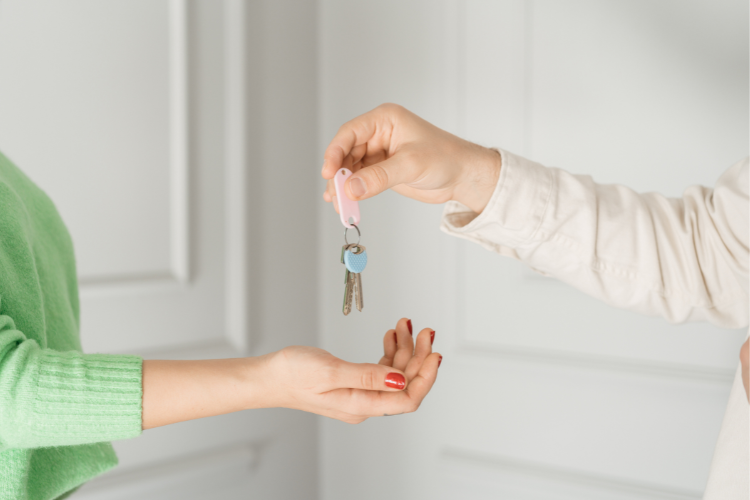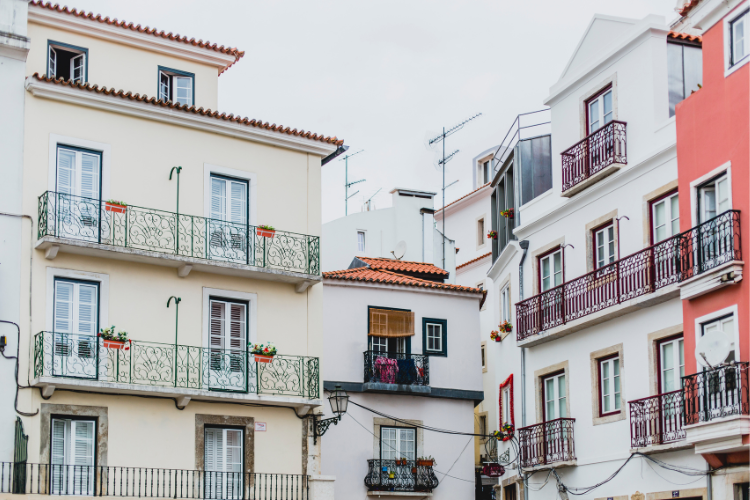Last Updated on January 9, 2025 by Laila Oliveira
In the picturesque landscapes of Portugal, the age-old dilemma of renting vs buying a property unfolds against a backdrop of rich cultural heritage and diverse geographical wonders. The decision to rent or buy a property in Portugal is multifaceted, influenced by economic factors, lifestyle preferences, and long-term investment goals.

With its charming villages, vibrant cities, and coastal allure, Portugal offers a captivating real estate landscape. Renting provides flexibility and a commitment-free lifestyle, allowing expats to explore different regions before settling down. On the other hand, buying a property represents an investment in the country’s enduring charm, offering the potential for long-term stability and appreciation.
As the Portuguese real estate market evolves, the choice between renting and buying becomes a nuanced decision shaped by individual circumstances and aspirations. This post delves into the considerations that sway the balance between renting vs buying in Portugal, shedding light on the unique dynamics of this region’s property market.
Who can buy a property in Portugal?
In contrast to certain nations globally, Portugal imposes no specific limitations on individuals eligible to purchase property within its borders. Notably, the Portuguese government actively encourages foreign investment in the real estate sector.
Initiatives such as the Golden Visa program demonstrate the government’s commitment to facilitating real estate investments, offering potential pathways for obtaining Portuguese citizenship.
Foreign nationals who relocate to Portugal often find the process of buying property in the country simple and no different from what the locals do. Portugal boasts a favorable legal framework and extends a welcoming environment for foreign investors. This ensures that the experience of buying property in Portugal is both seamless and rewarding.
Process of renting vs buying a property
Renting in Portugal is often not as complicated as buying a property. The paperwork is significantly reduced, eliminating the need for a mortgage. Additionally, rented properties often come fully furnished, facilitating an immediate move-in experience.
However, for those considering permanent residence in Portugal, acquiring a home may be a proper alternative. Such a property can serve as a personal dwelling and an investment opportunity, allowing you to generate additional income through renting.
When it comes to renting, there are two ways to go about it: Renting through a property agency or directly through a private landlord. Whatever option you choose, you must possess a tax number, known as Número de Identificação Fiscal (NIF), and show proof of identity.
In cases where multiple individuals are involved in the rental arrangement, each person must submit their respective documentation. Additionally, you will be asked to present a bank statement, tax return, or evidence of employment as part of the rental application process. Renting through an agency is recommended since not every landlord can speak English.
Buying a house is often more complicated than renting; you not only have to find the right house for you but also go through a bunch of paperwork. Here are some documents you will need to have during the process.
- ID or Passport;
- Portuguese Tax Number (NIF);
- Bank statements;
- Criminal record certificate;
- Purchase agreement;
- Property tax information.
Additional Paperwork
Other than that, there is additional paperwork that is equally as important. Remember, you’re purchasing real estate, which must be documented to protect your assets legally.
- Housing Technical File (Ficha Técnica de Habitação): This document features all the technical descriptions of that particular property.
- Certificate of Land Registry (Certidão do Registo Predial): You can get this document from the local land registry. It documents the property’s legitimate owner before the resale.
- The license of use (Licença de Utilização): Get this document from the local parish. It describes the purpose of the property.
- Building book (Caderneta Predial): This is another critical document showing the property’s regular tax compliance record. You can get it from the local finance department as well.
Prices of real estate in Portugal
Real estate prices in Portugal have experienced notable growth in recent years, particularly in popular areas such as Lisbon, Porto, and the Algarve.
However, real estate prices can fluctuate based on various factors, including economic conditions, demand, and regional dynamics. In urban centers like Lisbon and Porto, property prices tend to be higher, driven by increased demand and limited availability of prime real estate.
Coastal towns, particularly in the Algarve region, attract property buyers and impact local prices. While this is true, it is also worth mentioning that the cost of real estate is still within a reasonable range compared to other countries in Europe and North America.
- Read Also: Complete Guide to Real Estate Market in Portugal.
Rent Prices
Here is a detailed comparison of the cost of rents:
| City | Cost of Renting Property in m2 |
|---|---|
| Aveiro | 9.3 € |
| Beja | 8.9 € |
| Braga | 8.6 € |
| Castelo Branco | 6.9 € |
| Coimbra | 9.4 € |
| Évora | 10.3 € |
| Faro | 13.1 € |
| Leiria | 8.9 € |
| Lisboa | 19.0 € |
| Madeira (Ilha) | 12.8 € |
| Portalegre | 5.6 € |
| Porto | 14.9 € |
| Santarém | 7.4 € |
| São Miguel (ilha) | 9.6 € |
| Setúbal | 12.5 € |
| Viana do Castelo | 8.1 € |
| Vila Real | 6.2 € |
| Viseu | 6.9 € |
Estimates are from Idealista (as of January 2024).

Buying Prices
Here is a detailed comparison of the cost of buying property in Portugal.
| City | Cost of Buying Property in m2 |
|---|---|
| Aveiro | 1,662 € |
| Beja | 1,067 € |
| Braga | 1,515 € |
| Bragança | 865 € |
| Castelo Branco | 861 € |
| Coimbra | 1,377 € |
| Évora | 1,299 € |
| Faial (Ilha) | 1,309 € |
| Faro | 3,215 € |
| Guarda | 689 € |
| Leiria | 1,549 € |
| Lisboa | 3,861 € |
| Madeira (Ilha) | 2,848 € |
| Pico (Ilha) | 1,364 € |
| Portalegre | 700 € |
| Porto | 2,487 € |
| Porto Santo (Ilha) | 2,165 € |
| Santa Maria (Ilha) | 1,882 € |
| Santarém | 1,128 € |
| São Jorge (Ilha) | 1,325 € |
| São Miguel (ilha) | 1,604 € |
| Setúbal | 2,464 € |
| Terceira (Ilha) | 1,144 € |
| Viana do Castelo | 1,409 € |
| Vila Real | 949 € |
| Viseu | 1,073 € |
Estimates are from Idealista (as of January 2024).
Is renting better than buying?
The decision to buy or rent depends on your financial goals, lifestyle, and individual circumstances. Renting provides flexibility, making it easier to relocate for job opportunities or lifestyle changes without the commitment of buying a property.
Also, renting a property in Portugal is typically simpler than purchasing. The paperwork involved is significantly reduced, and there’s no requirement to secure a mortgage for payment.
Buying property, on the other hand, also comes with its fair share of advantages. Certainly, if you’re contemplating permanent residency in Portugal, it might be worthwhile to invest in purchasing a home.
When you buy a property, you are building equity over time. As you make mortgage payments, you own a tangible asset that may appreciate in value. Real estate has the potential for appreciation, and you may benefit from the property’s increased value over the years.
- Read Also: Buying A House In Portugal: How-To & Prices
Benefits of renting a property as an expat
Opting to rent a property provides a practical answer if you prioritize flexibility and shorter-term commitments. Numerous compelling reasons contribute to the attractiveness of choosing to rent within the Portuguese context. Let’s discuss a few.
Flexibility to explore
First and foremost, renting allows you to experience different neighborhoods, regions, and local lifestyles before making a long-term commitment to a specific location. This flexibility is particularly valuable if you are new to the country or uncertain about your preferred living environment.
It provides the opportunity to adapt to the local culture, assess personal preferences, and make informed decisions about where to settle in the long run. Additionally, it allows expats or newcomers to Portugal to explore various aspects of the country, ensuring that the chosen location aligns with their lifestyle and preferences before considering more permanent housing options.
Let’s Move to Europe
With Viv Europe your plans for Europe will come to a reality
Lower initial cost
Opting to rent a property in Portugal often comes with the advantage of lower initial costs compared to buying. When renting, the upfront expenses typically include a security deposit and possibly the first month’s rent payment.
This is in contrast to purchasing a property, which involves substantial initial costs such as a down payment, closing costs, and potentially other fees associated with securing a mortgage. Lower initial costs make renting an attractive option for those who may not be ready or able to make a significant upfront financial commitment.
Reduced maintenance responsibility
As a tenant, you are typically not responsible for major maintenance or repair costs. Instead, these responsibilities fall on the property owner or landlord. This can be particularly beneficial for individuals who prefer a hassle-free living experience without the financial burden or time commitment associated with handling significant maintenance issues.
Renting allows tenants to enjoy the comforts of a property without being directly responsible for its long-term upkeep, making it an appealing option if you value convenience and wish to avoid the potential stress and costs associated with property maintenance.
Drawbacks of renting a property
While renting has its fair share of advantages; it also comes with its fair share of disadvantages that you should be aware of. Let’s take a look at a few.
Limited control over the property
One of the primary drawbacks of renting a house in Portugal is the limited control tenants have over the property. Unlike homeowners who can freely customize their living spaces, renters often face restrictions on modifications.
This limitation can impact the ability to personalize the living environment according to individual preferences. This lack of autonomy can be particularly frustrating if you wish to create a space that truly reflects your lifestyle or design sensibilities.
Whether it’s the desire for a fresh coat of paint, the installation of built-in storage, or other structural adjustments, you may find your hands tied, unable to mold your living environment to suit your unique needs.

Increase in rent and lease terms
Another significant disadvantage that tenants often grapple with is the ever-increasing rents and lease terms, adding a layer of complexity to the rental landscape.
The country, particularly in urban areas like Lisbon and Porto, has experienced a surge in demand for rental properties, leading to market dynamics that may result in periodic rent hikes. This can significantly impact tenants’ budgets and financial planning, creating uncertainty and potential strain on household finances.
Also, the terms of leases in Portugal can vary, and tenants often face uncertainty regarding the renewal or extension of their lease agreements. Landlords may choose not to renew leases, requiring you to search for alternative housing.
The lack of lease-term stability can disrupt established routines and create a sense of instability for individuals and families seeking a more permanent living arrangement.
Benefits of buying a property as an expat
The advantages of buying property in Portugal are multifaceted, offering a blend of financial stability, lifestyle enrichment, and the promise of a lasting investment. For the sake of better understanding, let’s go through the main perks of buying property in Portugal as an expat.
Building equity and wealth
One of the primary advantages of buying property in Portugal is the opportunity to build equity over time. As you make mortgage payments, you also become a stakeholder in the property, gradually building a tangible asset.
This equity serves as a form of savings, providing a financial cushion and contributing to overall net worth. Property values in Portugal have shown a positive trend in recent years, presenting homeowners with the potential for long-term investment gains. Whether for personal use or as a rental investment, real estate in Portugal offers a pathway to financial growth and stability.
Long-term investment
As mentioned earlier, real estate markets in Portugal have demonstrated positive growth trends in recent years. By investing in property, you stand to benefit from the potential increase in the value of your assets, contributing to long-term wealth accumulation.
Property owners in Portugal can leverage their assets to generate rental income, especially in popular tourist destinations or urban centers.
This rental income can serve as a steady stream of revenue over the long term, contributing to the property’s overall return on investment. Lastly, if you consider Portugal a retirement destination, owning property offers financial stability during retirement. With a fully owned property, you eliminate monthly mortgage expenses, ensuring a more predictable and stable financial situation.
Stable monthly payments (with a fixed-rate mortgage)
If you desire to own a home in Portugal, you will be glad to find out that there are proper payment options that are not only affordable but quite stable. With a fixed-rate mortgage, expats in Portugal enjoy the advantage of stable and predictable monthly payments.
The interest rate remains constant throughout the loan term, providing clarity and allowing you to budget effectively. Stable monthly payments contribute to long-term cost control for homeowners. Knowing that mortgage payments will remain unchanged over the life of the loan enables you to manage your finances with confidence, avoiding unexpected increases in housing expenses.
Renting vs buying a property in Portugal
As mentioned before, when it comes to renting vs buying property in Portugal, there are a few factors that often affect your decision-making. These factors can be diverse and personal, reflecting financial considerations, lifestyle preferences, and long-term goals. Here are key factors affecting renting vs buying in Portugal.
Your lifestyle habits
The decision concerning renting vs buying a house in Portugal as an expat is notably impacted by your lifestyle habits. If your expat lifestyle involves frequent relocations due to work assignments or personal preferences, renting provides the flexibility to easily move from one place to another without the constraints of property ownership.
However, for expats with a more settled lifestyle or those planning to stay in Portugal for an extended period, buying a house may align better with the desire for stability and a long-term commitment.
Also, if you prefer financial flexibility and want to allocate funds to other investments, travel, or experiences, renting allows you to avoid the financial commitment of a mortgage and associated homeownership costs.
If you recognize real estate as a valuable investment, possess financial stability, and consider homeownership a long-term financial objective, purchasing may be a more fitting choice for you.
Availability of funds
The availability of financial resources is a pivotal aspect that can markedly impact your choice to rent or buy real estate in Portugal. While property prices in Portugal are reasonable, not everyone can manage the upfront payment. In these situations, renting emerges as a favorable alternative for temporary accommodation.
Deciding a place to live permanently
Purchasing a property indicates a long-term commitment. If you plan to settle in Portugal permanently and want the stability of homeownership, buying might be a good option. Renting provides more flexibility. If your plans are uncertain or if you prefer the freedom to relocate easily, renting may be a better choice.
Do you need help renting vs buying a property in Portugal?
The decision between renting vs buying a property in Portugal is complex, involving careful consideration of various factors. Your choice should align with your long-term goals, financial stability, and personal preferences.
Buying may be a suitable option if you value stability, have a long-term commitment to Portugal, and are financially prepared for homeownership responsibilities.
On the other hand, if flexibility, uncertainty about your future plans, and a desire for reduced maintenance responsibilities are priorities, renting might be the better choice.
If you require assistance with immigration and locating a suitable property for rental or purchase, feel free to book a consultation with Viv Europe.
For advice from fellow expatriates who have undergone similar experiences, join our Facebook Group – All About Portugal For Expats. Pose inquiries, connect with renters and property owners, and discover your new residence!





